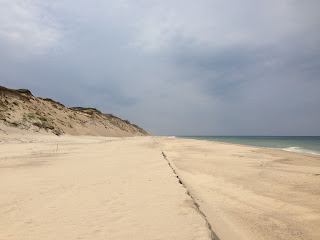East coast perfection: Secret spot, Cape Cod, MA.
1/2 mile walk through scrub pine and rose hips to a deserted beach. Wishing I had my board. The sandbars that form these glassy little slides are notoriously ephemeral. I think of the the Japanese Zen poets who developed a philosophical-aesthetic mode from the experience of fleeting perfect natural beauty. They called it Yugen; the feeling of beauty mixed with melancholy by virtue of impermanence. This aesthetic feeling corresponds to the Buddhist philosophical understanding that the joy of the recognition of truth is suffused with a joyful sorrow. Truth from a Zen Buddhist perspective is a recognition of the impermanence and flux of all phenomena, including one's own sense of self and of all the relationships between an individual and other people, objects, and ideas that constitute one's sense of self.In this aesthetic/philosophical moment of experience there is the joy of recognition mingled with the sorrow of loss. One looses perpetually at the very instance of finding, for there is no-thing to be found. Reality is empty of things. Emptiness in this sense does not mean absence. Rather emptiness refers to how "things" have no self-inherent nature. What we refer to as things are a composition of co-dependently arising phenomena.
The waves at this secret spot are a perfect example. A few days prior to this morning, somewhere out at sea, a strong wind whipped across the ocean surface in a particular direction. This wind occurred at a particular distance away from land so that the energy the wind transferred into the water separated and organized itself into coherent waves traveling at defined intervals from one another. Coastal currents, the flux of tides and the violence of winter storms colluded into the perfect mix of dune erosion and sediment deposit for the ocean floor in this spot to extend long, flat and shallow from the shore. The tide at the moment of these waves had to be just so. The wind energy rolling through the water trips on the shallow sand bar, rises and spills into these "things" that we call waves. But where is the wave in the wave? The thing is many things, and there for it is no-thing. You can't abstract any single wave from all the phenomena that the thing we call a wave depends on. And the existence all these phenomena are in turn, dependent on infinite collusions of various other phenomena, and on an on. All phenomena are in flux, impermanent, tenuous, precious. We like when they glint and glisten like waves in the sun, when the recognition of beauty becomes the beauty of recognition.







